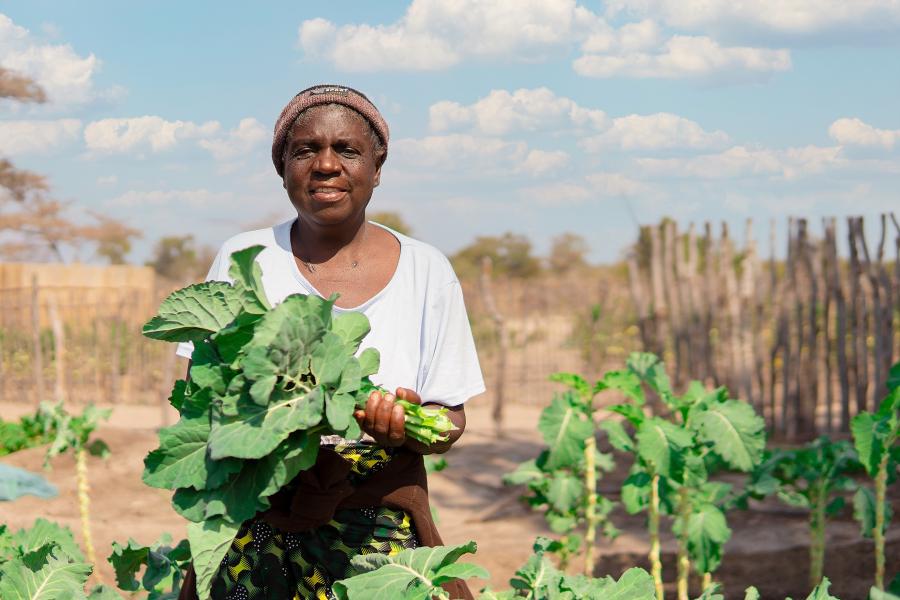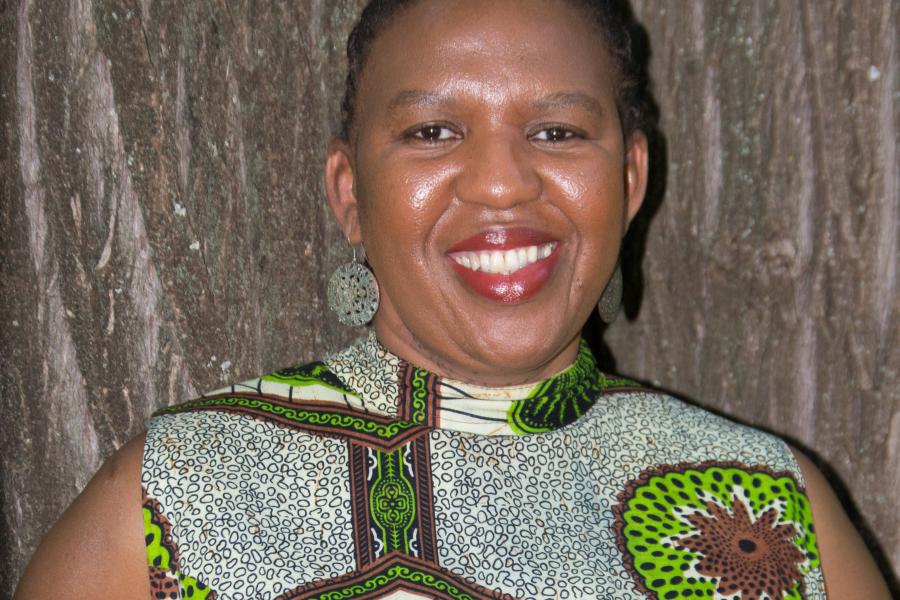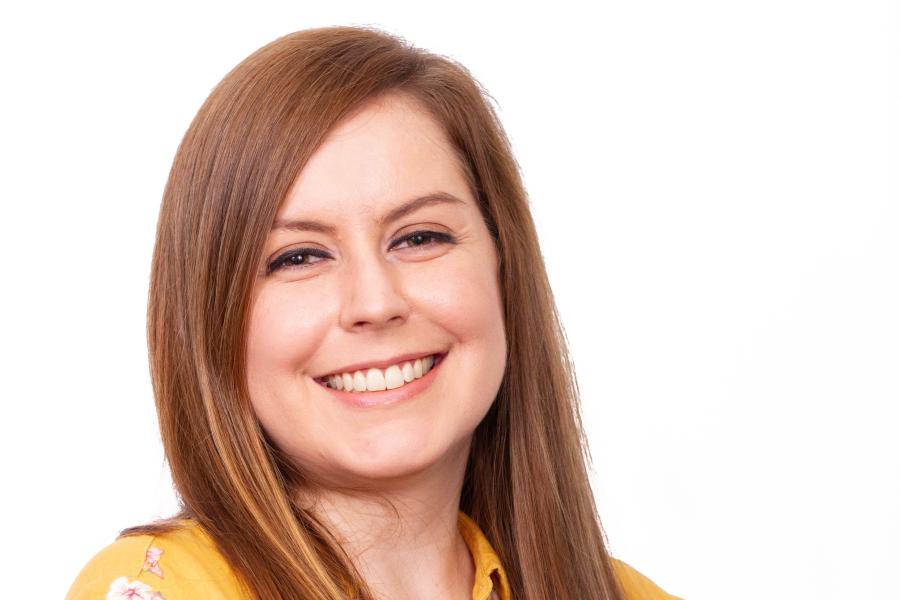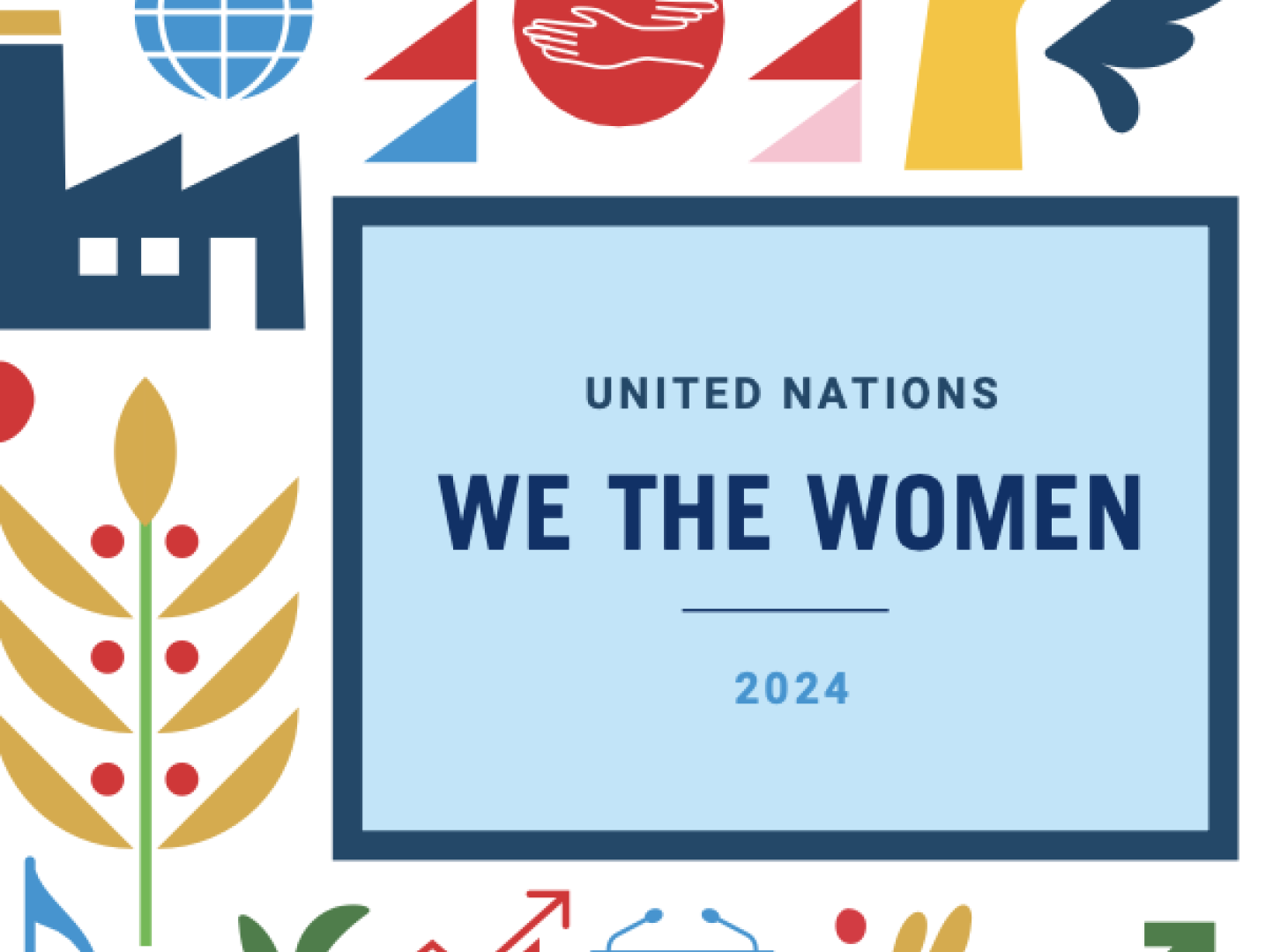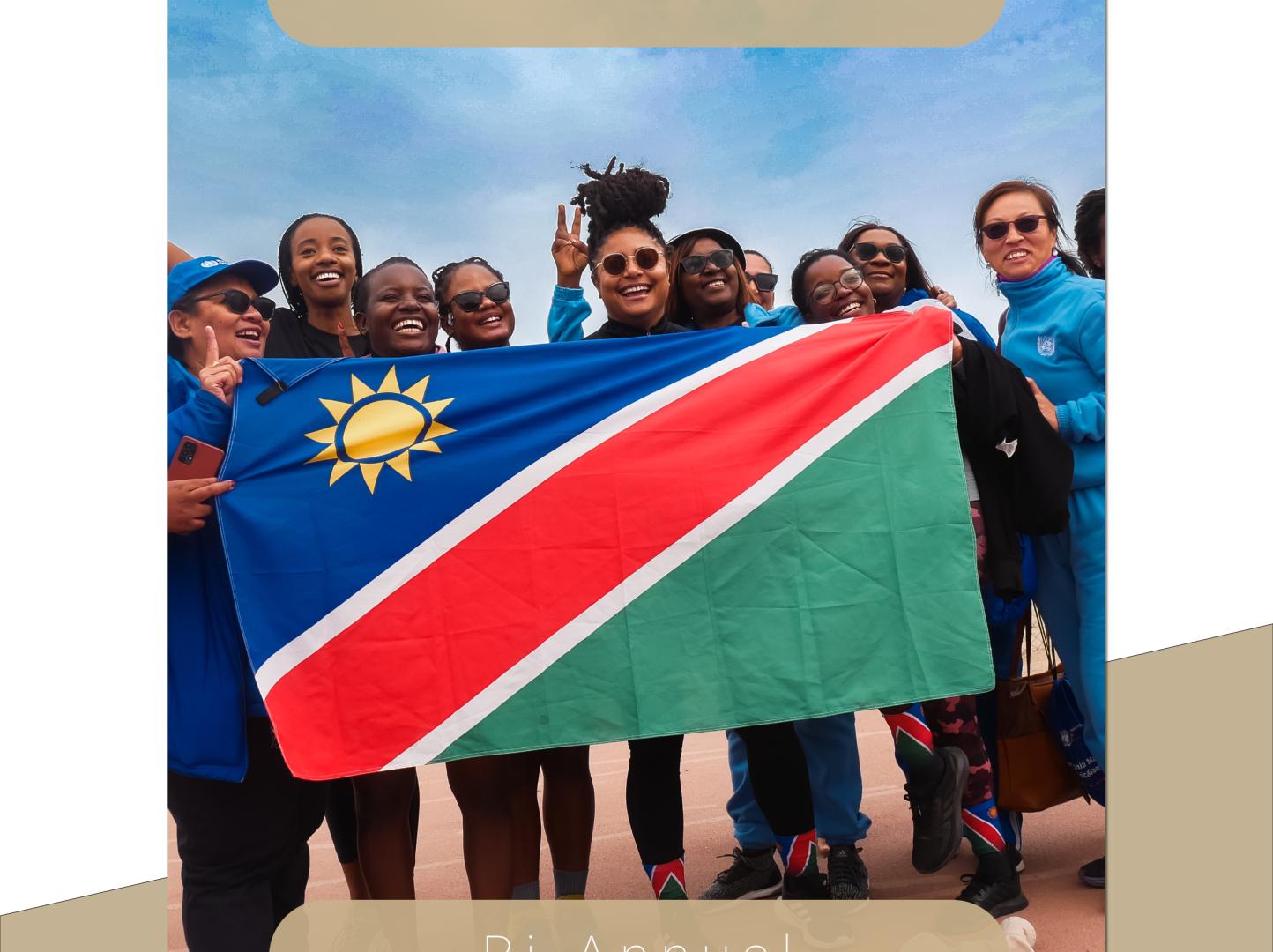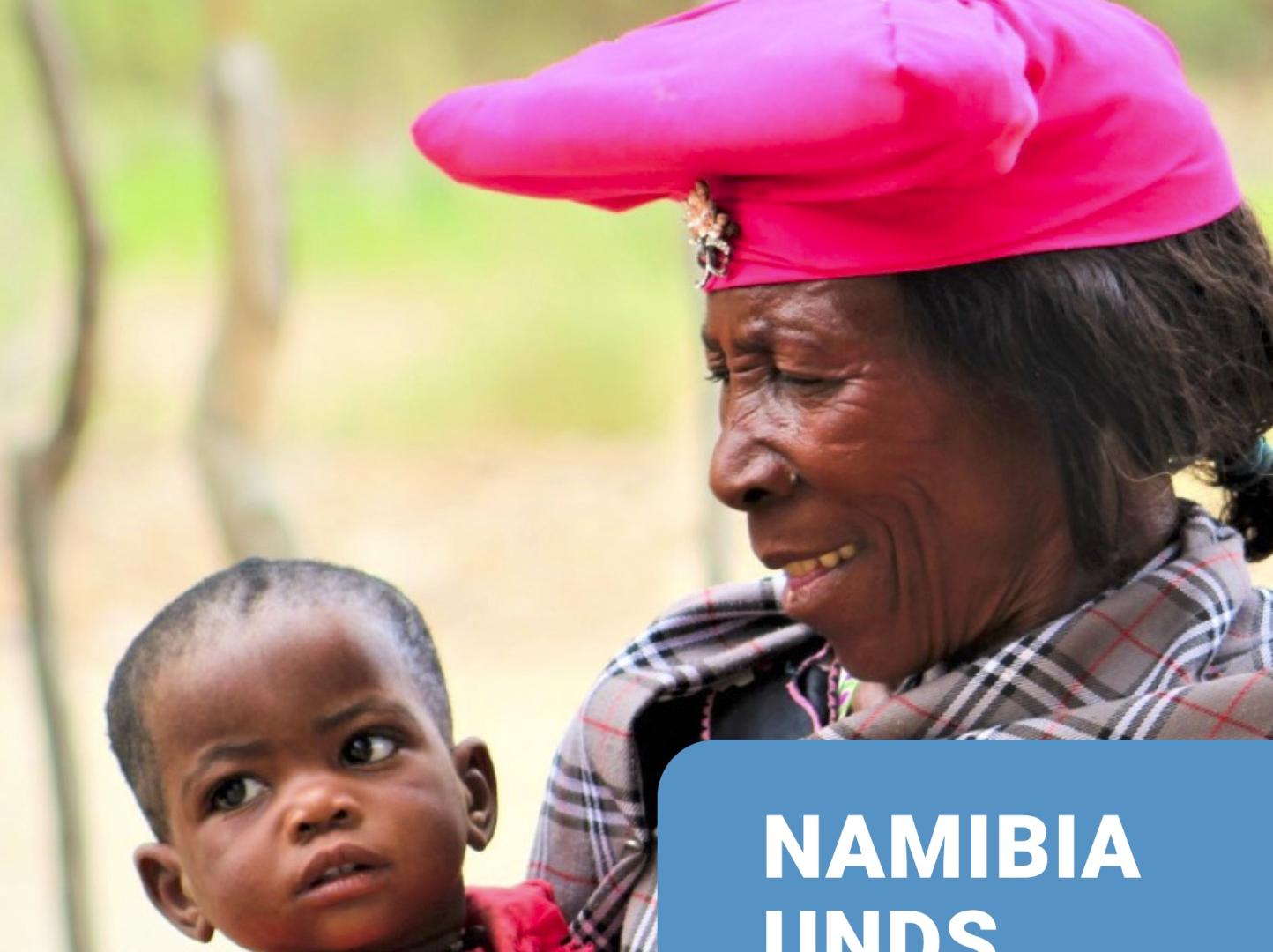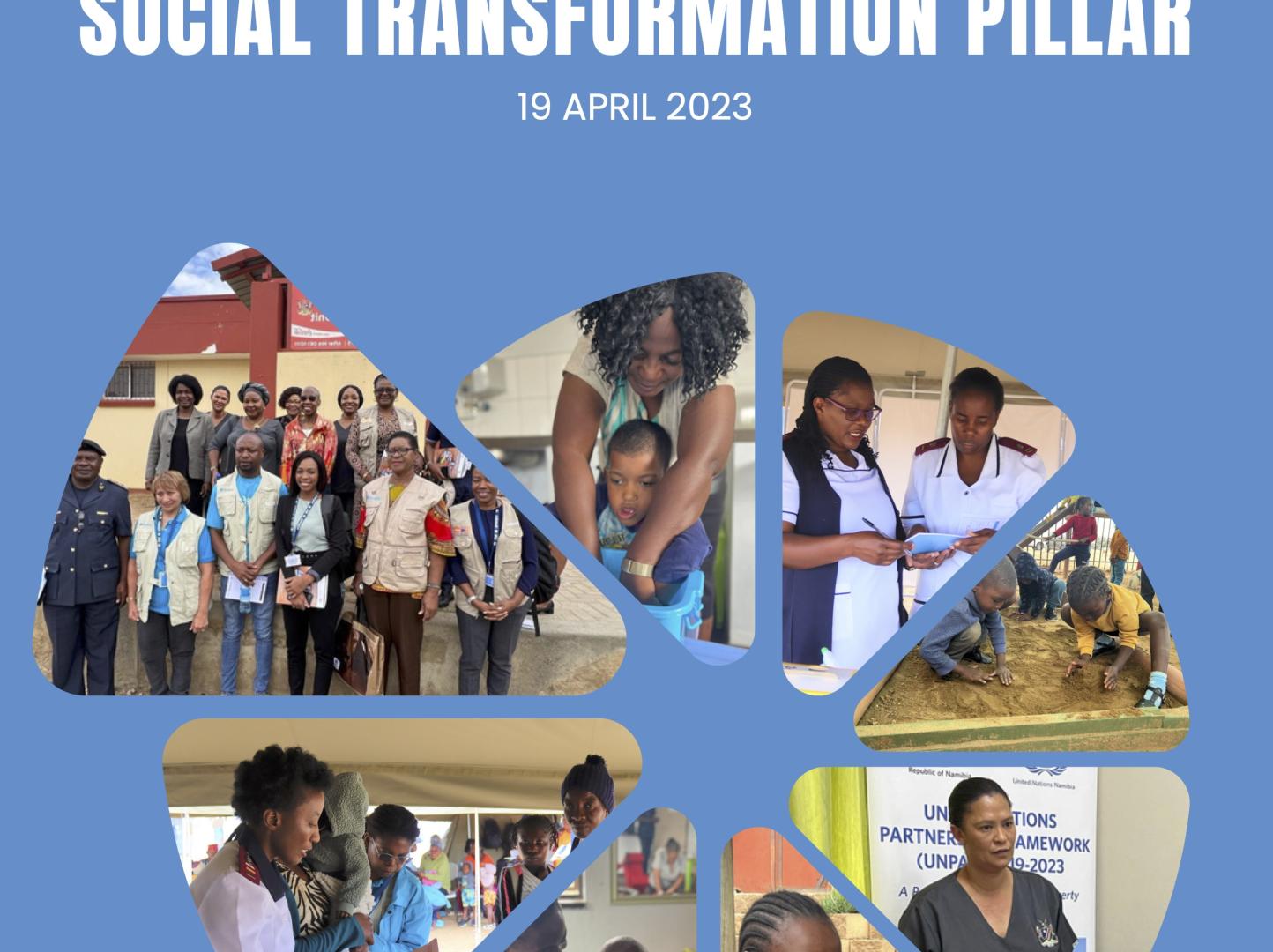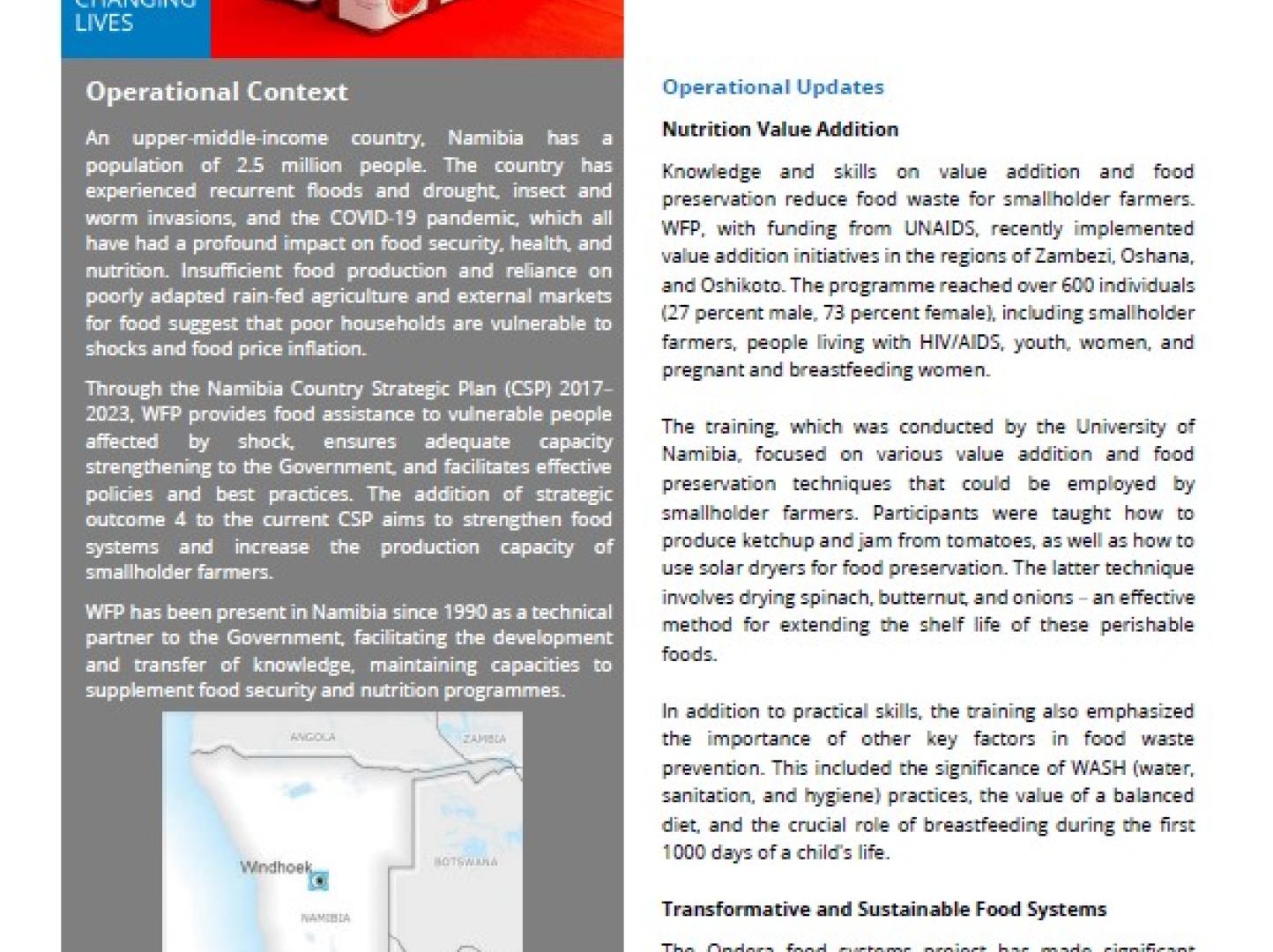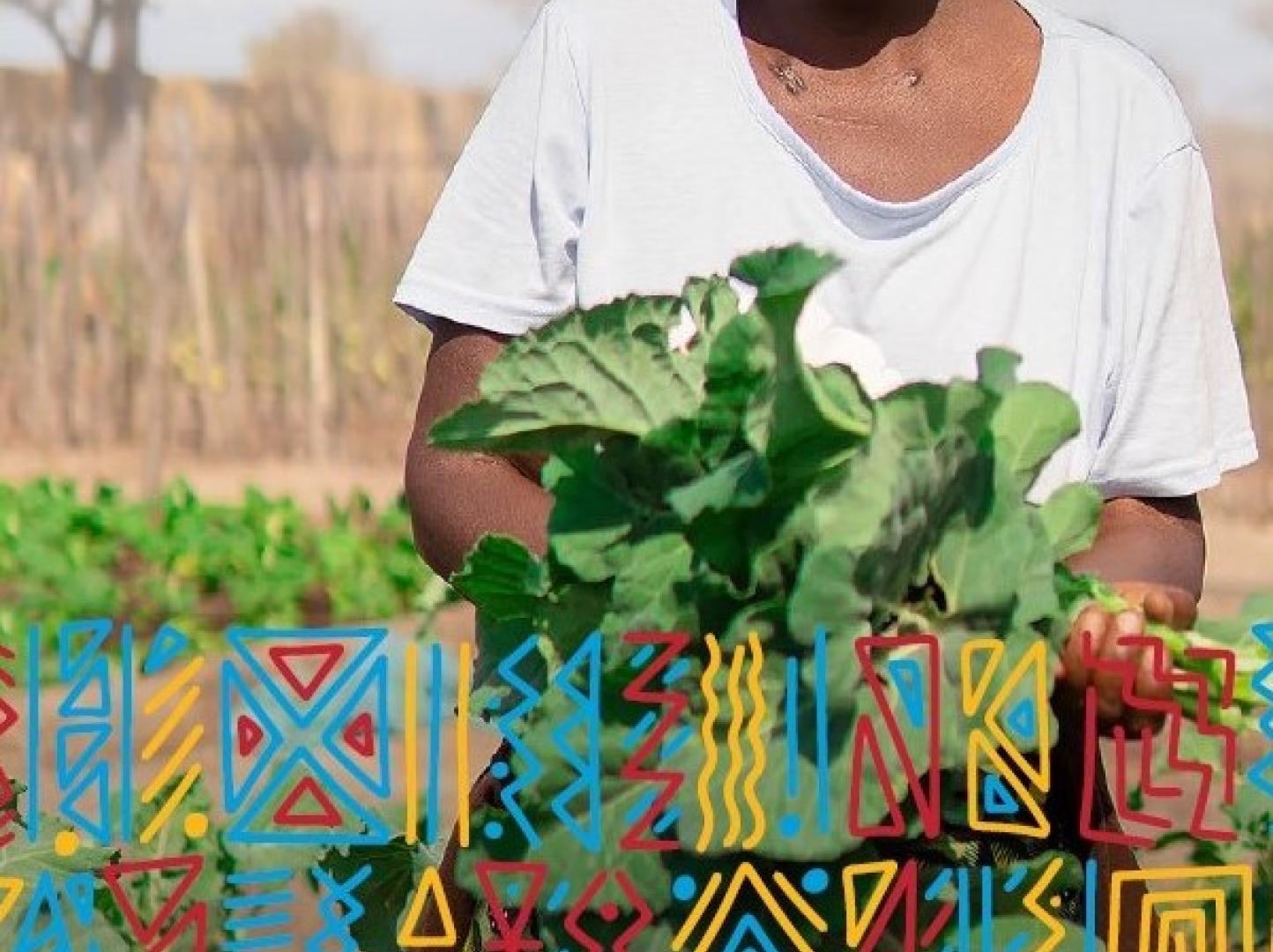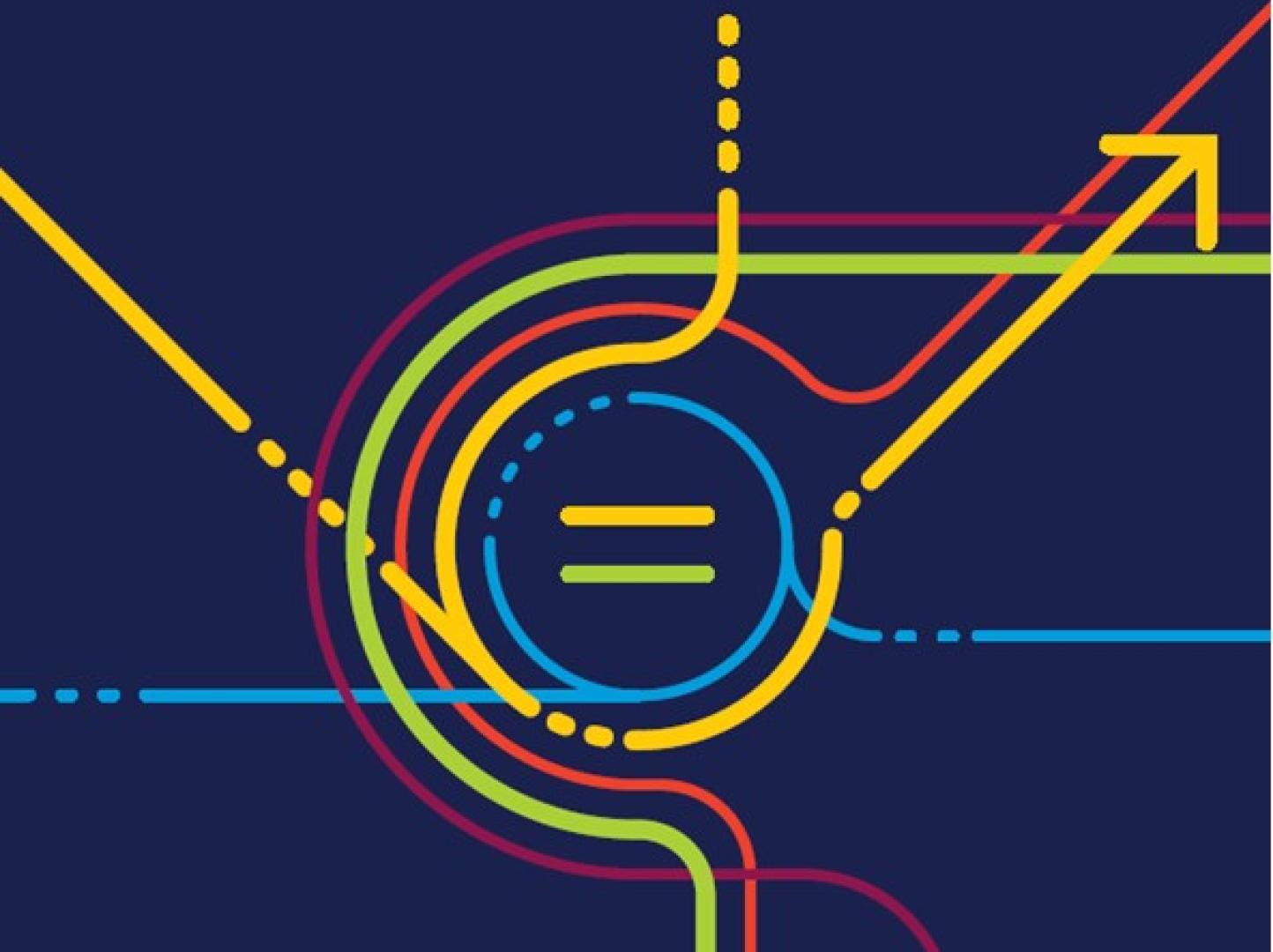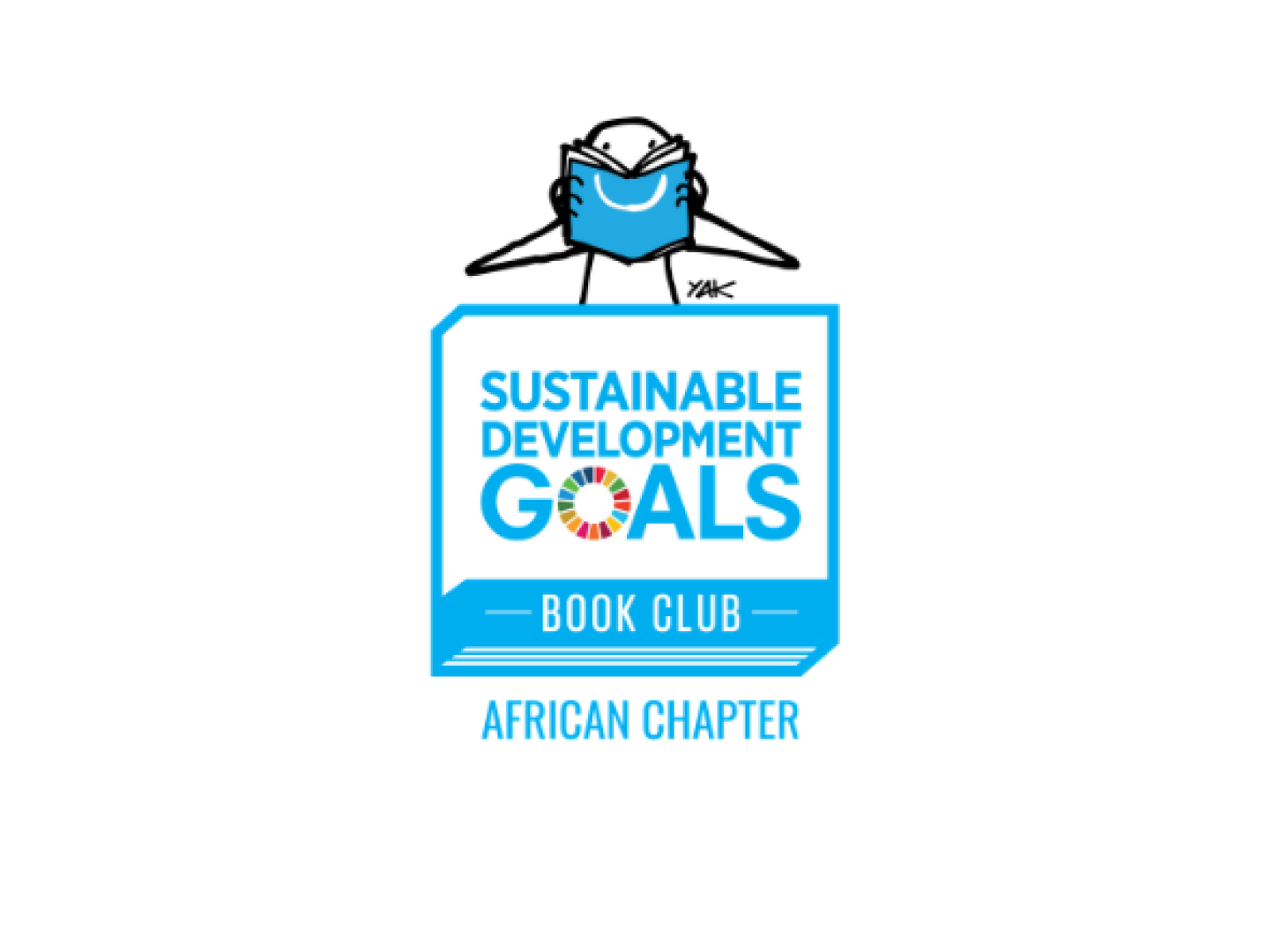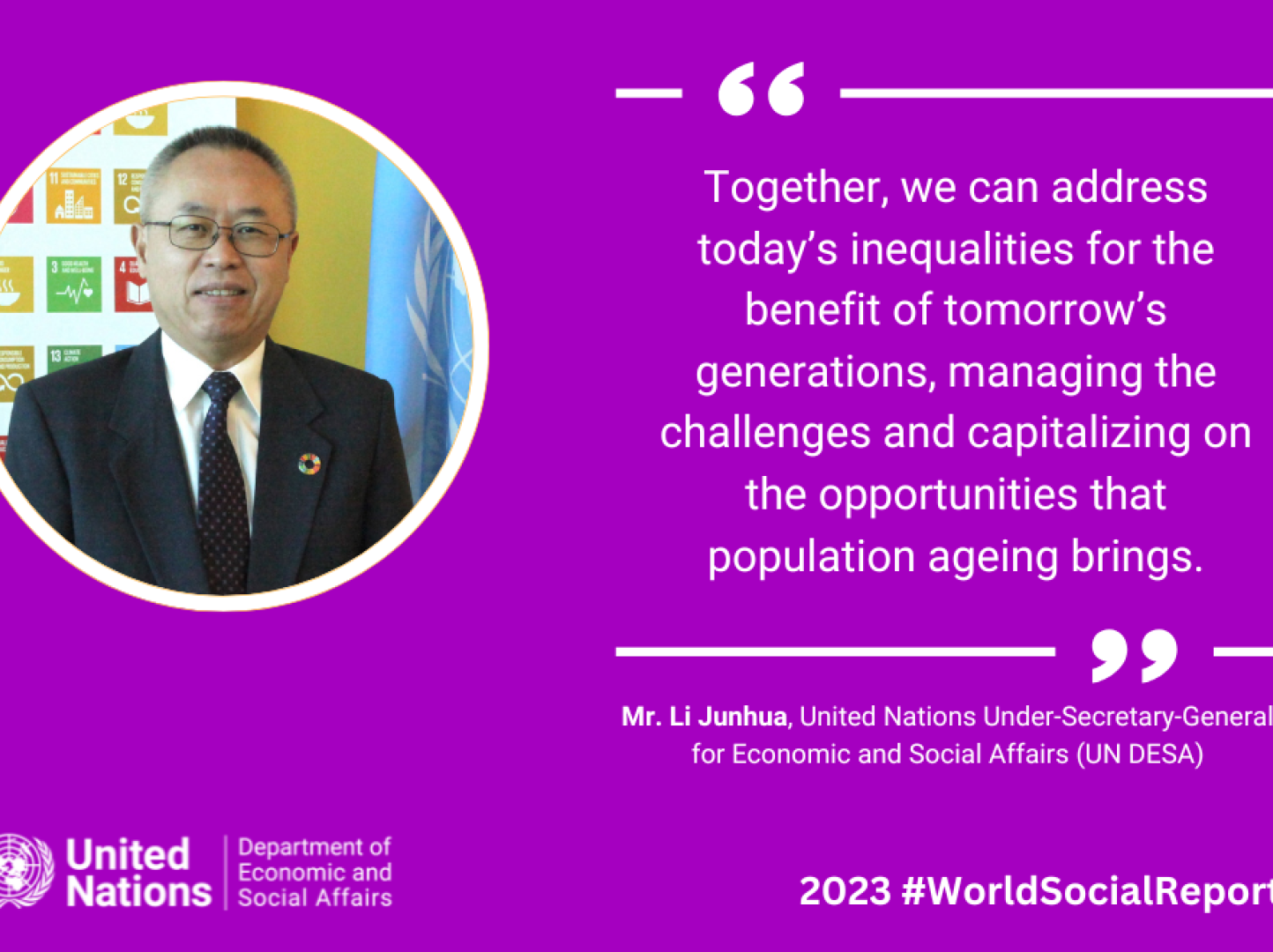Latest
Story
03 April 2024
Women Leaders Unite in Namibia to Shape a Better Future
Learn more
Story
22 March 2024
Japan Ambassador, UN Resident Coordinator & UNICEF Rep visit Rundu Hospital to appreciate joint efforts in supporting maternal, newborn & child health programs
Learn more
Story
18 March 2024
UN Namibia Resident Coordinator: Praises Resilience Amid Challenges During Recent Visit to Government Projects supported by WFP, in Southern Namibia
Learn more
Latest
The Sustainable Development Goals in Namibia
The Sustainable Development Goals are a global call to action to end poverty, protect the earth's environment and climate, and ensure that people everywhere can enjoy peace and prosperity. These are the goals the UN is working on in Namibia.
Story
27 November 2022
FAO supporting Namibia to develop new Comprehensive Conservation Agriculture Programme
The first ever Comprehensive Conservation Agriculture Programme (CCAP 2015-2020) registered commendable progress towards improving food production and incomes for farmers in Namibia. The Framework aimed to increase the application of CA principles and practices among the crop-growing farmers of Namibia.
Godfried Meeja, from Otjozondjupa region says that adopting CA was the best decision he ever made as a farmer as he increased yields and now earns a decent income, while Paulina Aluuma added her voice to the awareness encouraging other farmers to adopt CA as it is an effective means to counter negative climate change effects such as low and variable pattern rainfall experienced in their Oshana region.
“CA has been promoted as an entry point to Climate Smart Agriculture and has the potential to contribute towards mitigation of some of the climate change and food systems challenges in Namibia,” Mildred Kambinda, Deputy Executive Director in the Ministry of Agriculture, Water and Land Reform (MAWLR) noted in the meeting to evaluate the ended CA framework.
Formulating second generation of CA Framework
The Food and Agriculture Organization of the United Nations (FAO) through a 10 countries regional project “Strengthening Coordination, Scaling Up and Governance of Conservation Agriculture in Southern Africa (SUCASA)” is supporting development of the second generation of CCAP in Namibia.
The five-year Programme will inspire Namibia’s farmers towards adopting CA in order to ensure resilience, food security and nutrition as well as environmental protection.
The development of the first generation of the CA framework was also supported by FAO in partnership with the Ministry of Agriculture, Water and Land Reform (MAWLR).
“As the global climate crisis intensifies, more and more countries are beginning to adopt climate-smart, sustainable agriculture to ensure food security to feed millions of vulnerable people", Ferdinard Mwapopi, Assistant FAO Representative (Progammes) in Namibia said during a consultative meeting.
"Namibia still remains a net importer of food items and is thus highly exposed to environmental and economic factors affecting it as well as those prevailing in food exporting countries, and this increases its vulnerability to the shocks", added Mwapopi.
Transitioning to climate-smart agriculture practices
Consultations among key stakeholders are underway from development partners, academia and farmers to guide the design of the new intervention, and also ensure ownership and its successful implementation.
The new CA framework is being designed with the technical support from FAO and will seek to transition Namibian farmers from rain-fed traditional farming practice toward climate-smart agriculture.
Conservation Agriculture adoption and scaling up is highlighted in the 5th National Development Plan for Namibia 2017-2022 and the MAWLR Strategic Plan 2017-2022. The country has a target to have more farmers adopt at least one of the CA practices; minimum tillage, crop rotation and organic soil cover, by 2025 to ensure food and nutrition security.
The urgent need to scale up CA
Agriculture in Namibia is primarily rain-fed with the majority of the population engaged in subsistence farming.
“Despite agriculture being the main source of food for the smallholder farmers, most conventional farming practices have negative impacts on the ecosystems and contribute to environmental degradation, for example loss of soil quality,” Mwapopi noted.
With the country’s vulnerabilities such as prolonged dry spell and floods which at times take place simultaneously, Conservation Agriculture adoption would provide sustainable food production.
The FAO support is aimed at enhancing institutional and individual capacities of researchers, extension officers and farmers to enable the adoption of new agricultural good practices for improved crop production.
The capacities of the MAWLR are being developed to promote CA principles to help farmers increase production and productivity, thus reducing risks and building resilience to climate change.
1 of 5
Story
27 November 2022
Youthconnekt Namibia Launched
OTJIWARONGO, Namibia — The Ministry of Sport, Youth and National Service, in partnership with the United Nations Population Fund (UNFPA) and the United Nations Development Programme (UNDP), officially launched the YouthConnekt Namibia initiative on 21 September 2022.
YouthConnekt Africa is a Pan-African program established by the African Union to co-design and expedite suitable solutions for youth socio-economic development, as well as to support intergovernmental knowledge exchange on policy, initiatives, and collaborations.
Operationalised in 2020, the YouthConnekt Africa hub aims to contribute to the achievement of Africa’s Sustainable Development Goals (SDGs) mandate, the AU 2063 agenda and the AU Youth Charter.
Through national YouthConnekt initiatives, the hub accomplishes its mandate by coordinating a global network to create a continental ecosystem for African youth; sharing experience and knowledge on programme and policy design, youth initiatives and providing a conduit for resources at scale and data on youth empowerment initiatives.
The Deputy Minister of Sport, Youth and National Service, Hon. Emma Kantema-Gaomas said YouthConnekt Namibia aims to involve Namibian youth in the YouthConnekt Africa Hub, where they will be expected to share ideas, submit business initiatives and acquire technical development skills.
“Our mandate as a ministry is focused towards the promotion of youth empowerment initiatives as expounded in our third national youth policy. It is, therefore, our duty to ensure that we join hands with development partners and other progressive organisations in the development of youth,” said Hon. Kantema-Gaomas during the launch.
She added that there is an urgent need for youth participation at the top end of the country’s economy, hence, the government has put together a variety of policy interventions designed to bring youth into the mainstream of the economy in order to improve inclusion and cohesion.
“Africa's most valuable resource is its youth, and Namibia is no exception, with youth constituting the majority of the population,” she stated.
Loide Amkongo, UNFPA Namibia Assistant Representative and Officer in Charge urged youth to read more to keep abreast with developments and opportunities. “Read, Reach and participate,” she advised the youth during a panel discussion on how Namibian youth can prepare themselves to fully benefit from the YouthConnekt.
“Finally Namibia has officially become part of YouthConnect Africa. We have started to connect with youth from all over Namibia and I cannot wait to connect with youth from the rest of the continent. I want to thank our government for this wonderful initiative, bringing youth together for problem-solving, promoting youth engagement, and empowering the youth,” said Valmary Jantjie, a youth from! Kharas region.
Riaan Siyama, a youth from the Zambezi region also looked forward to connecting with fellow youth and hearing their thoughts and ideas, especially on how to end gender-based violence (GBV) in the country. Siyama is a co-founder of Building Every Opportunity for Change, a civil society organisation that works with men to prevent GBV in Zambezi region.
“Without concerted efforts to address GBV and other forms of gender injustices, the lives of women and girls in the country remain at risk."
"I’m very thankful that we have been accorded the opportunity to be part of the YouthConnekt Namibia launch where we can showcase our work as well as collaborate with other youth around the country and make it effective for us to combat these social illnesses in our country,” he added.
The fifth YouthConnekt Africa Summit took place in Kigali, Rwanda in October this year, where hundreds of young people from the member states of YouthConnekt Africa gathered to share experiences, knowledge, and skills. Some of the members of YouthConnekt Namibia attended the summit in Kigali.
1 of 5
Story
14 November 2022
Adolescents and youth with disabilities, and adolescents living with and affected by HIV empowered on HIV and Sexual & Reproductive Health and Rights
UNAIDS Namibia in collaboration with the Namibian National Association of the Deaf (NNAD) and National Federation of People with Disabilities in Namibia (NFPDN) with the support of UNICEF and UNFPA recently facilitated a two-day workshop on HIV and Sexual and Reproductive Health and Rights (SRHR) in Windhoek, as part of the 2gether4SRHR initiative.
The workshop provided a safe platform for adolescents to interact and share key issues, successes and challenges that they face, for enhanced programming to address gaps in the HIV response, and to strengthen linkages between adolescents with disabilities and other adolescents, including those living with and affected by HIV to strengthen inclusion and partnerships.
The COVID-19 pandemic severely disrupted access to life-saving sexual and reproductive and other health services for adolescents, especially those with disabilities and those living and affected by with HIV. The COVID-19 pandemic severely disrupted access to life-saving sexual and reproductive and other health services for adolescents, especially those with disabilities and those living and affected by with HIV.
In her opening remarks, Dr Alti Zwandor, UNAIDS Namibia Country Director, encouraged participants to actively contribute during the workshop and continue engaging in programmes for and with youth and adolescents to end inequalities. “I hope that your views, suggestions, and recommendations from this workshop will inform the outcome document that will be developed to provide guidance on gender-transformative and human rights-based interventions for adolescents with disabilities in Namibia."
" I therefore urge you to be as free, open, and frank as possible,” said Dr Zwandor.
Among other challenges, the lack of sign language interpreters and skills is a big concern in Namibia as interpreters are usually fully booked when needed by the hearing-impaired community. This was also highlighted by the Namibia Planned Parenthooh Association (NAPPA), a youth friendly service provider for sexual and reproductive health (SRH) care and support.
This continues to limit access to health and other social and essential services, leaving people with disabilities behind. “We often get discouraged to seek services from health facilities as there are no sign language interpreters to communicate our needs to healthcare workers and information hardly reaches us," said Martha, an adolescent with hearing impairment. Participants emphasized the need for the inclusion of adolescents with disabilities in the HIV and COVID-19 responses to ensure that people with disabilities access quality and equitable health services.
UNAIDS has long advocated for a three-track approach to advance the inclusion of people with disabilities in the HIV response, being:
Disability-specific activities and mainstreaming disability across all aspects of HIV responses.
Participation and active involvement of people with disabilities in all programme elements.
Disability-inclusive policies, programmes and implementation strategies that ensure appropriate funding and resources.
UNAIDS Namibia calls for all partners to use the social model, which acknowledges that the current inequalities are not due to peoples’ disability or vulnerability, but the inability of society to eliminate barriers challenging persons with disabilities. This will ensure inclusive development and programming for adolescents and youth so that they benefit from available services, and that the social and structural barriers that prevent young people from accessing HIV services are removed.
Speaking on behalf of the NFPDN, Mr. Orben Muluti calls for communities to start practicing equity and not equality.
“Equity will help us move to a better world, where all societal systems recognize the issues of people with disabilities and work collectively with them to mainstream disability in all aspects of life.” said Muluti.
In closing, the NNAD Director, Mr Paul Nanyeni highlighted the limited communication modalities for people with disabilities and emphasised the need to strengthen joint advocacy for the inclusion of sign language as an official language in Namibia.
The workshop was facilitated by various partners including AfriYAN Namibia, Regain Trust, NAPPA, Youth Empowerment Group (YEG), UNFPA, UNICEF and UNAIDS. The outcome document will be shared with all stakeholders for accelerated action for HIV and SRHR programming for adolescents with disabilities.
1 of 5
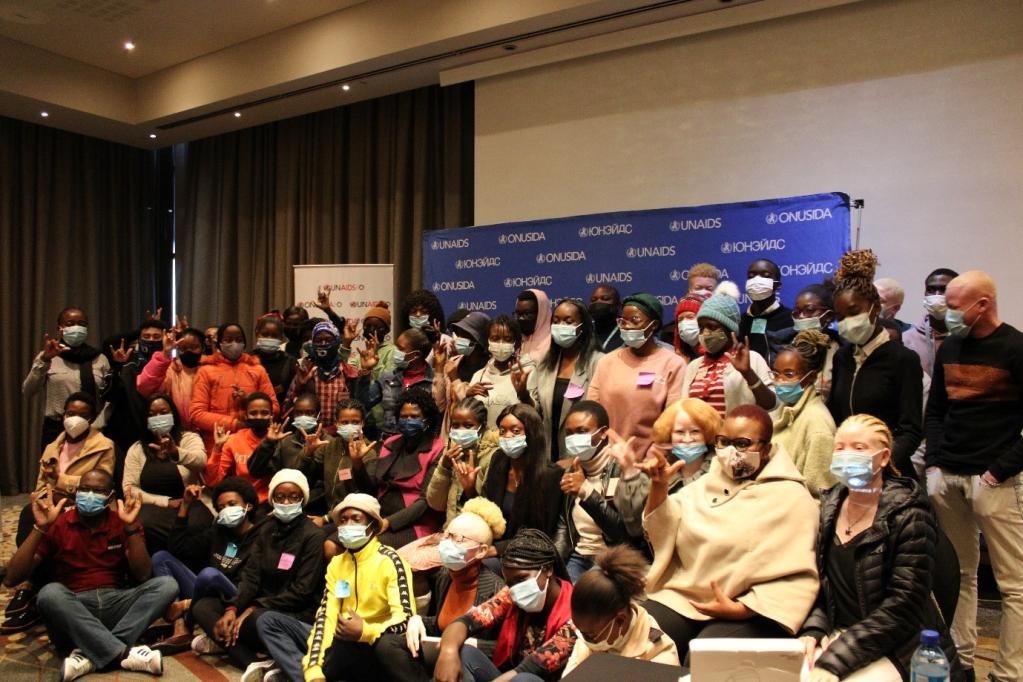
Story
03 December 2022
International Day of Persons with Disabilities Marks 29 Years of Disability Advocacy
It was first launched in 1992 by the United Nations General Assembly Resolution 47/3. The event is in its 29th year of celebration, marking nearly three decades of meaningful change for the community of Persons with Disabilities.
Such days allow us to pose and shine a light on different situations of Persons with different disabilities worldwide and what our contributions as society are towards the inclusion of persons with disabilities in all areas of life.
This day is aimed at celebrating the successes of persons with disabilities and promoting their rights and well-being in all spheres of society and development.
Although we live in a world where the contributions of persons with disabilities are not seen, it is very important to remember that a disability is less than the abilities of someone with a disability.
This year’s theme is “Transformative solutions for Inclusive Development: The Role of Innovation in Fueling an Accessible and Equitable World”
Focusing on three areas namely-
Employment,
Sports and
Innovation by and for persons with disabilities.
Today and every day the UN is working together with people with different disabilities to create a world that is accessible, equal and inclusive for our fellow Brothers and Sisters who are differently abled, but the UN cannot do this alone since disability is a cross-cutting issue.
How can you assist the UN in creating an accessible, equal and inclusive world for persons with disabilities around you?
As we commemorate the 2022 International Day of Persons with Disabilities, we do enjoy the following poem entitled "No One" by Ms Pelgrina Ndumba, a UN Namibia Country Staff Member with a Visual Impairment.
No one
Seeking the acceptance of our communities should not be in vein, because no one will live our lives on our behalf.
A life of societal discrimination and ignorance should be a story of the past, because no one can live our lives on our behalf.
A helping hand to cross the street or to count money should not discourage us from achieving our goals, because no one should live our lives on our behalf
We are valuable agents of change; we are well able and should make a mark on the world because no one will live our lives on our behalf.
We are more than our faces; we are more than what you see. Our potential SHOULD be fully realized because no one will live our lives on our behalf.
Nothing about us will be done without us, because no one will live our lives on our behalf
Daily, we must face the inescapable challenges birthed from stigma and hate.
We are who we are today, because no one will live our lives on our behalf.
Morale
In whatever you do always be yourself, because you are not who you are by mistake and don’t let anything or anybody put you down, because you are able.
1 of 5
Story
15 November 2022
Towards an Early Warning System for Harmful Algal Blooms in Namibia
IOC-UNESCO and Namibia’s Ministry of Fisheries and Marine Resources organized major consultation to assess the specific needs and requirements for establishing an early warning system for harmful algal blooms in the Southern African country.
About 300 hundred species of microalgae are reported at times to form mass occurrences, so-called algal blooms. Nearly one-fourth of these species are known to produce toxins harmful to nature and to human beings, and the scientific community refers to these algal events as ‘Harmful Algal Blooms’ (HAB).
Proliferations of microalgae in marine or brackish waters can cause massive fish kills, contaminate seafood with toxins, and alter ecosystems in ways that humans perceive as harmful.
The impact of harmful microalgae is particularly evident when marine food resources (e.g. fisheries and aquaculture) are affected. Even though not all species are visibly affected by harmful algal blooms – such as shellfish and finfish –, they accumulate the toxins in their organs and subsequently transmit them to humans through consumption, leading to serious health threats.
“In the interest of food safety for the end consumer, an early warning system for HABs will serve as a food safety intervention tool to identify potential risks required to be managed; to maintain consumer and customer confidence; and to expand national, regional and international trade through the promotion of a safe seafood commodity.” - Heidi Skrypzeck, the Ministry of Fisheries and Marine Resources in Namibia
Monitoring of harmful algal blooms is essential in providing forecasts and early warnings for a potential HAB event, enabling regional authorities, industry, or individuals to take actions to mitigate public health, environmental, or economic risks and impacts.
The 5-6 October workshop gathered 32 participants from government ministries, the private sector, academic institutions, and official laboratories to define the early warning system requirements for Namibia, review current capacities and resources in place, and outline missing knowledge and data gaps.
As a result of collaboration between the Government of Namibia, UNESCO’s Intergovernmental Oceanographic Commission (IOC-UNESCO) and UNESCO’s Windhoek Office, the workshop marked the starting point of the development of an early warning system for HABs in Namibia combining monitoring with a mitigation and adaptation strategy.
“Through its Intergovernmental Oceanographic Commission, UNESCO strives to assist Member States in managing and mitigating the impacts of harmful algae, essential for a productive and sustainable seafood industry.” - Henrik Enevoldsen, Head of Ocean Science at IOC-UNESCO
The workshop helped national stakeholders identify and share the main causes and effects of harmful algal blooms in Namibia, including mortalities, human food poisonings, ocean oxygen depletion, and the associated economic and ecological impacts – in particular on the export of shellfish products.
Participants identified an urgent need to establish a rapid monitoring and regulatory framework to ensure the protection of human health and safe seafood trade from the regular occurrence of harmful algae in the country.
“Engaging from the beginning with the different stakeholders is crucial to ensure that the early warning system being developed will eventually effectively meet their specific needs.” - Marie-Yasmine Dechraoui Bottein, invited expert from the University of Côte d’Azur
1 of 5
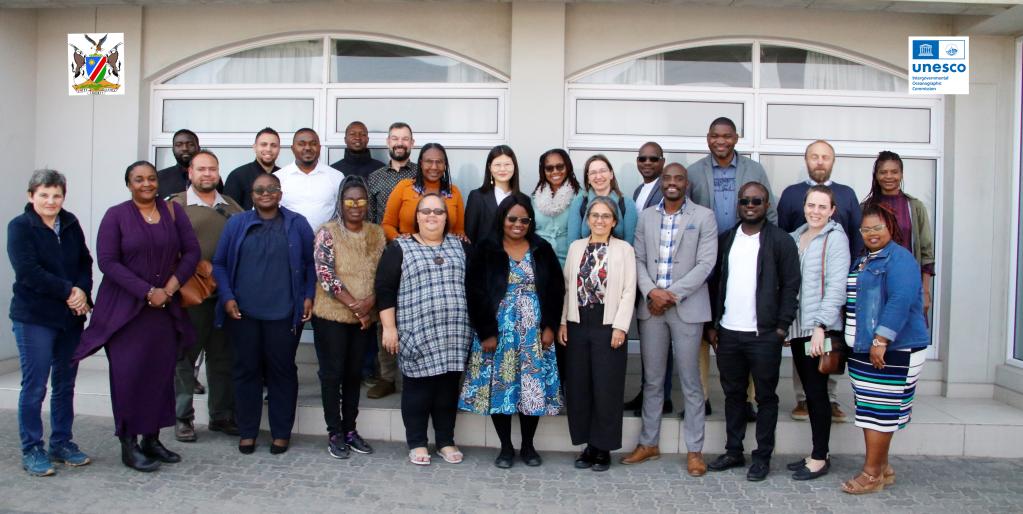
Story
03 April 2024
Women Leaders Unite in Namibia to Shape a Better Future
Windhoek, Namibia - Today, UN Namibia hosted the "We the Women" Intergenerational Dialogue, a campaign aimed at amplifying the voices of women and girls in Namibia and worldwide on critical global issues and multilateralism. Women from various fields and walks of life convened for the dialogue. The dialogue, led by the Resident Coordinator to Namibia Ms. Hopolang Phororo, brought together women from various generations to discuss the opportunities and challenges they face in shaping a better future. Participants highlighted the increasing access to information through technology and the growing representation of women in leadership positions as positive developments. However, they also acknowledged the persistent pressures women face in balancing multiple roles without adequate support. Unemployment emerged as a major challenge, with participants exploring potential solutions such as community-based initiatives and digital skills training. Education was identified as both an opportunity and an area requiring attention, with internships and vocational training being proposed as a means to empower more women. The importance of inclusive education was emphasized to ensure that all women can achieve their full potential. Intergenerational differences and shrinking civil society spaces were among the concerns raised during the dialogue. Participants recognized the impact of technology but stressed the need for open dialogue across generations to guide its influence. Protecting girls online and in traditional media was also identified as a priority. The dialogue also touched on environmental issues and the underrepresentation of women in leadership positions in sectors like agriculture. Participants committed to advocating for gender-sensitive policies and inclusive solutions tailored to the diverse needs of women. Despite the challenges, the women leaders expressed optimism about the progress made so far and the work that lies ahead. They agreed that through unity, empowerment, and leveraging their voices, they can meaningfully shape a better future. The "We the Women" campaign recognizes that although the UN Charter begins with "we the people," women had limited representation during its signing and minimal involvement in shaping the institution and its objectives. Through inclusive platforms like this dialogue and an ongoing global survey, the campaign aims to gather diverse perspectives and collective actions that will influence the UN's vision for the future, including the Outcome document of the Summit of the Future to be adopted in September 2024. Women and girls across Namibia are encouraged to participate in the global survey by visiting [https://bit.ly/3wO8oMa](https://bit.ly/3wO8oMa) and sharing their voices. The contributions gathered will supplement the perspectives shared during the dialogue, ensuring that the concerns and aspirations of women and girls are heard on a global scale.
1 of 5
Story
22 March 2024
Japan Ambassador, UN Resident Coordinator & UNICEF Rep visit Rundu Hospital to appreciate joint efforts in supporting maternal, newborn & child health programs
Rundu, Namibia - The United Nations Resident Coordinator, Ms. Hopolang Phororo, joined the Honorable Hisao Nishimaki, Ambassador of Japan to Namibia, and UNICEF Representative, Mr. Samuel Ocran for a visit at the Intermediate Hospital Rundu Maternity department on 22 March, to appreciate the joint efforts of the UN, the Government of Japan, and local health authorities in supporting maternal, newborn, and child health programs.The visit, led by Ms. Idah Mendai, the Kavango East regional health director, aimed to showcase the impact of the UN's collaboration with key partners in strengthening healthcare services in the region. The team toured the maternity department and interacted with nurses and other health practitioners to understand how cold chain equipment and related immunization supply chain training, provided through the UN's support, are being utilized to save children's lives.Ms. Phororo expressed satisfaction upon hearing testimonials from clinical health workers on how their skills training, facilitated by the UN and its partners, is translating into lives saved. However, the visit also shed light on gaps in essential equipment, which the UN and the Government, along with other development partners, have committed to addressing jointly. UNICEF, a key UN agency in this partnership, has been instrumental in providing technical expertise and resources to improve maternal and child health outcomes in the region. Mr. Ocran, the UNICEF Representative in Namibia, emphasized the organization's dedication to supporting the Government's efforts in this regard. The Government of Japan, represented by Ambassador Nishimaki, has also been crucial in funding these initiatives.The visit underscores the UN's commitment to strengthening partnerships, which is at the center of realizing the Sustainable Development Goals, particularly in ensuring good health and well-being for all. As the UN continues to foster such collaborations, it remains dedicated to supporting Namibia's efforts to enhance healthcare services and build a more resilient health system.
1 of 5
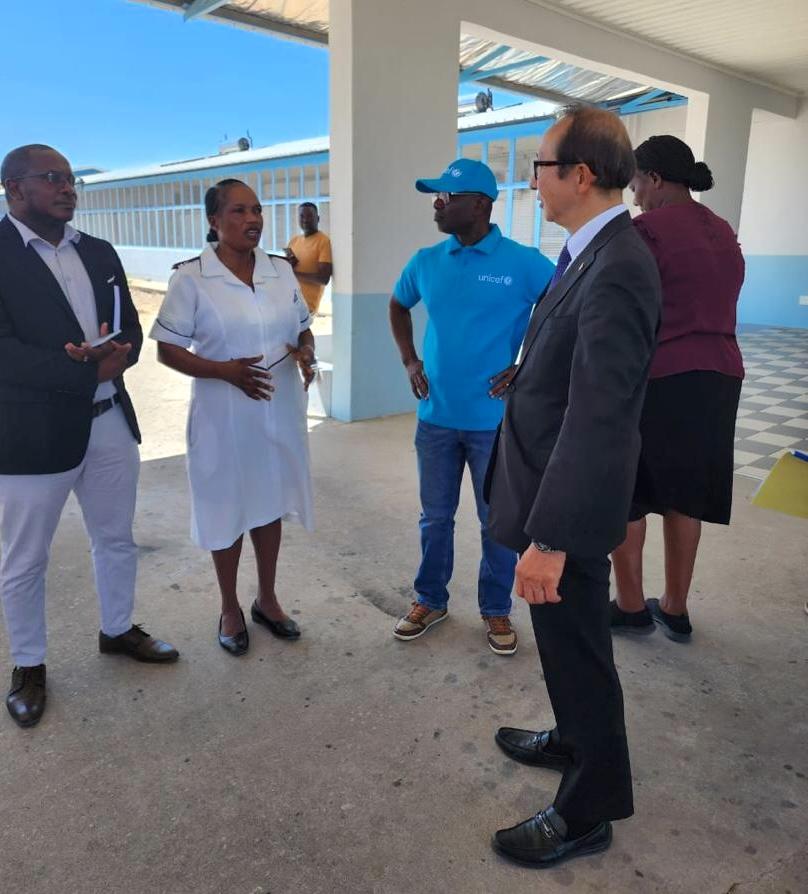
Story
18 March 2024
UN Namibia Resident Coordinator: Praises Resilience Amid Challenges During Recent Visit to Government Projects supported by WFP, in Southern Namibia
Windhoek, Namibia – Ms. Hopolang Phororo, the United Nations (UN) Resident Coordinator (RC), and Ms. Ericah Shafudah, World Food Programme (WFP) Deputy Country Director in Namibia, recently visited food systems projects in southern Namibia to gain valuable insights on the various WFP-implemented projects.During the visit, Ms. Phororo paid a courtesy call on Hon Governor Aletha Fredericks of the //Kharas Region and Hon Councillor Jeremias Goeiemann (MP) of the Berseba Constituency, to understand contextual challenges experienced and appreciate opportunities for strengthening collaboration in the region. The visit highlighted the success of the Berseba Integrated Food Systems Project, supported by WFP, which has improved diets and enriched the community of Berseba with a consistent supply of eggs and vegetables, despite extreme heat and erratic rainfall. In Hardap Region, Ms Phororo engaged the Hardap Governor. Rev Salomon April and officials from the Ministries of Education, Arts and Culture, Ministry of Health and Social Services and Ministry of Agriculture, Water and Land Reform. Ms. Phororo emphasized the importance of unity and collaboration in addressing issues pertaining to youth unemployment, access to education, quality health, data, and statistics gaps, as well as opportunities in agriculture. Ms Phororo also highlighted the potential of joint UN area-based programming to contribute to the attainment of national development goals and the UN Sustainable Development Goals by 2030.Ms Phororo visited government projects supported by WFPs in the Region - the Stampriet Primary School-Based Food Systems Project and the Hardap Correctional Facility Food Systems Project. The Stampriet Food Systems model has established a chicken coop and a horticultural vegetable garden aimed to diversify learners' diets, improve concentration in class, retention of children in school as well as contributing to their health outcomes. The surplus from the garden is sold to the market for income generation. The Hardap Correctional Facility's food systems project is a multifaceted collaboration that has had a significant impact on the nutritional intake of over 300 vulnerable communities and offenders. Additionally, it equips inmates with valuable skills in horticulture as well as regenerative and climate-smart agriculture, which are invaluable as they are rehabilitated for reintegration into society. Through this project, offenders gain knowledge and experience in sustainable farming practices, fostering self-sufficiency and contributing to their rehabilitation process. Ms Phororo in sharing her field experience highlighted, “Projects such as these provide a strong foundation on which other agencies can build to address not only food insecurity but also other issues that the communities are grappling with, such as youth unemployment.” Ms. Phororo emphasized the potential of joint UN area-based programming to advance national development goals, which will be implemented under the Sustainable Development Cooperation Framework that is currently being formulated.
# # # About UN NamibiaThe United Nations (UN) in Namibia comprises 11 resident and non-resident agencies, funds, and programs, collaborating to support sustainable development in the country. For more information, please contact. Justus Sinimbo, RC Office/Namibia, +26481377710
# # # About UN NamibiaThe United Nations (UN) in Namibia comprises 11 resident and non-resident agencies, funds, and programs, collaborating to support sustainable development in the country. For more information, please contact. Justus Sinimbo, RC Office/Namibia, +26481377710
1 of 5
Story
09 February 2024
Namibia Launches Landmark Tourism Report with UN Support, Unlocking Economic Potential
Windhoek, Namibia - In a significant stride towards harnessing the economic power of tourism, the Namibian government, with substantial backing from the United Nations, unveiled the 6th edition of its Tourism Satellite Account (TSA) report on Thursday. This pivotal document, crafted with the UN World Tourism Organization's (UN WTO) methodology, shines a light on tourism's substantial direct contribution to Namibia's economy, underscoring its role as a key economic driver. The TSA findings are compelling, revealing that tourism directly contributed 6.9% to Namibia's GDP in 2022, equating to N$14.3 billion. This sector also emerged as a significant employment powerhouse, generating 57,571 direct jobs, which translates to 7.9% of total employment, illuminating tourism's capacity as a notable employer within the Namibian economy. Alex Shimuafeni, Namibia's Statistician-General, emphasized the report's importance, "Tourism is a notable employer in the Namibian economy, responsible for 57,571 direct jobs." This statistic not only highlights tourism's role in job creation but also its broader economic impact. The TSA's implications extend beyond mere numbers; it serves as a foundational tool for strategic planning and policy formulation. The Minister of Environment, Forestry, and Tourism, Pohamba Shifeta, highlighted the TSA's crucial role in offering "robust data to inform investment decisions." Echoing this sentiment, UN Resident Coordinator Hopolang Phororo praised the launch as a "milestone" showcasing government leadership, emphasizing that the findings should "seamlessly" shape Namibia. She underscored the tourism sector's potential to impact all SDGs, particularly Goals 8, 12, and 14, illustrating the TSA report's role in aligning tourism with global sustainability goals. This collaborative endeavor, showcasing a harmonized effort among UN agencies includingUNECA, UNESCO, and UNDP, reflects a unified commitment to fostering sustainable tourism development. The report not only marks a significant achievement in Namibia’s pursuit of economic resilience and diversification but also sets a benchmark for future tourism-related initiatives, ensuring the sector’s growth is both sustainable and inclusive. As Namibia continues to navigate the complexities of economic development, the TSA report stands as a testament to the power of partnership and data-driven strategy. It lays the groundwork for leveraging tourism as a catalyst for sustainable economic growth, ensuring that this vibrant sector remains at the heart of Namibia’s development agenda. For additional information, please contact:Ms. Eunice Ajambo. Economist and Development Coordination Officer, UN Namibia (ajambo@un.org)Ms. Helvi Elago. National Programme Officer, UNESCO Namibia (h.elago@unesco.org)
1 of 5
Story
13 December 2023
UN Team Visits Omaheke to Support Local Development in Namibia
Gobabis, Namibia - Ms. Hopolang Phororo, the UN's Resident Coordinator in Namibia, recently visited Omaheke. This trip, her first outside the capital since taking her role, aimed to see how the UN's help in health, nutrition, education, and against violence is making a difference. It's part of a bigger plan to make sure the UN's work meets Namibia's needs.
The team met with Governor Pijoo Nganate. They talked about Omaheke's efforts against malnutrition, like a new soup kitchen truck and a large farm project, showing the ongoing battle against hunger.
At Rakutuka Primary School, the UN is helping with programs that improve student health and education. The principal, Mr. Ford, shared how they need more community resources and support to keep improving things for students.
Then, they visited Epako Clinic, a crucial place for healthcare in Omaheke. The clinic is doing a lot with little, running health and food programs and helping victims of violence despite needing more staff and better equipment.
The visit also highlighted a program called Upshift, where local people are creating projects like eco-friendly charcoal, reusable sanitary pads, and sustainable houses. This initiative shows how local ideas can make a big difference.
Wrapping up, Ms. Phororo reflected on the UN's commitment to helping Omaheke grow and succeed. This visit gave a clear picture of the challenges and achievements in the region and set the stage for continued teamwork and practical solutions.
The learnings from this trip are crucial to planning how the UN will support Omaheke in the future, aiming to make lasting improvements in the community.
1 of 5
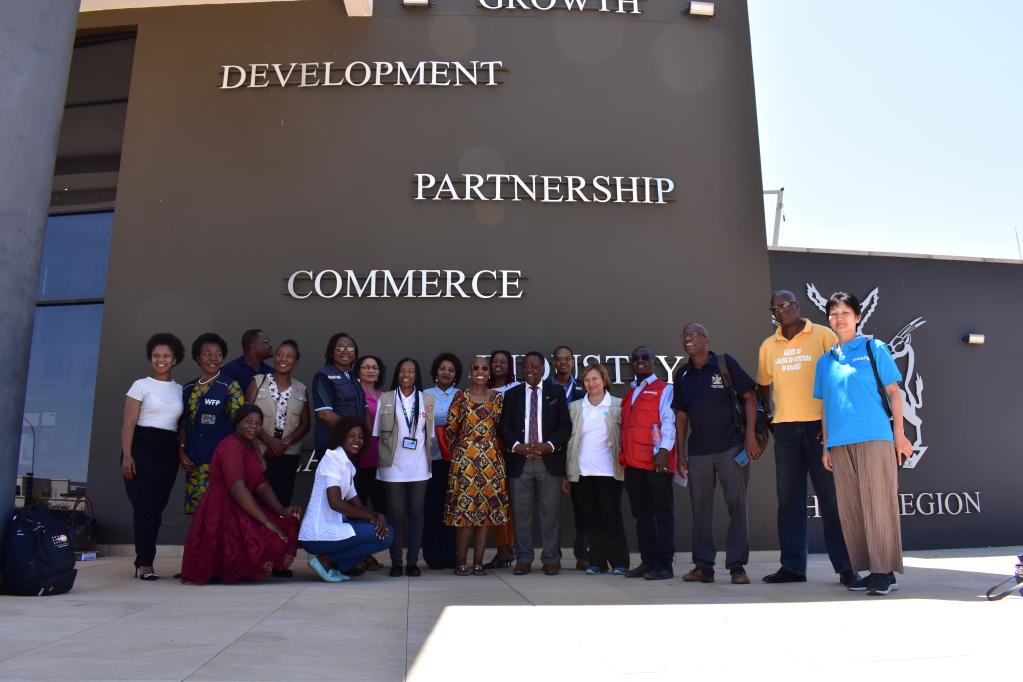
Press Release
28 November 2022
Labour Migration Governance Key to Protecting Migrant Workers in Southern Africa
The President of Zimbabwe, Dr Emmerson Mnagwanga will officially open the high-level conference which seeks to find ways to foster fair and effective labour migration governance and the protection of migrant workers in Southern Africa. Led by the International Labour Organization (ILO) and the International Organization for Migration (IOM), the High-Level Tripartite Dialogue is a culmination of activities and research organised by the Southern African Migration Management (SAMM) Project to identify priorities at the national level and advance in the implementation of country-level labour migration policies and action plans in the SADC region.
It is designed to improve migration management in the Southern African and Indian Ocean region guided by, and contributing to the realisation of, the 2030 Sustainable Development Agenda goal 8 on decent work and economic growth and goal 10 on reducing inequality and Objective 6 of the Global Compact for Migration (GCM) to Facilitate fair and ethical recruitment and safeguard conditions that ensure decent work.
Since almost half of all migrant workers in the SADC region are women, the conference will spotlight the importance of labour migration policies to be gender-responsive and evidence-based. For many women, as for men, migration can represent a positive experience and have important emancipating and empowering impacts.
According to the United Nations Department of Economic and Social Affairs (UNDESA, year ), the feminization of migration has reached significant levels in the Southern African region with 47 per cent of all migrants being female.
But often female migrants are confronted with gender specific disadvantages and vulnerability in the migration process and in their employment. Women workers, especially young female migrants, often end up in situations of double or even triple discrimination, disadvantage, marginalization and vulnerability (including violence and harassment as well as forced labour.
“Maximizing the benefits of labour migration and minimizing the risks and social costs requires sound and effective labour migration governance,” said Ms. Hopalong Phororo, ILO Director for ILO Country Office for Zimbabwe and Namibia. “Expert studies and data show that migration, particularly labour migration, is an important enabler and beneficiary of regional integration and economic development in Africa.”
Across the world, migration is largely linked to the search for a job and better wages, and even if employment is not the primary driver, it usually features in the migration process at some point. In Southern Africa, as in many parts of the world, migrants face prejudice, intolerance and stigmatization in their workplaces and communities.
“It is necessary to advocate for improved migration management in Southern Africa, as a pivotal approach to addressing the challenges of migration, and ensuring that migration has a positive outcome for the country, migrants, and the members of their families”, said Mr. Ashraf El Nour, IOM Regional Director for Southern Africa.
The Southern African region has had a long history of intra-regional migration. All Member States of the Southern Africa Development Community (SADC) are involved in labour migration flows as countries of origin, transit, or destination and often they play the three roles at the same time.
In the SADC region, migrant workers are present in agriculture, fishing, mining, construction, food processing, domestic work, caregiving, cleaning, restaurants-hotels, transportation and retail trade.
The two day conference will promote fair, ethical and effective labour migration governance through tripartism that brings Ministries of Labour/Employment, Home Affairs and Foreign Affairs, as well as workers’ and employers’ organisations and social dialogue particularly in the development of rights-based, gender-sensitive and evidence-based labour migration legislation and policies, taking account of labour market needs.
The conference will assess labour migration governance progress so far, gaps and challenges as well as main opportunities to consider in the SADC region. It will also identify tripartite constituents’ labour migration governance priority areas of collaboration, share existing and proposed good practices and recommendations and mention current roles and contributions. It will also provide a platform to tripartite partners to re-organise and re-strategize on labour migration governance in Southern Africa
About the SAMM Project
The SAMM Project is a United Nations Multi-Agency programme composed of the International Labour Organization (ILO), the International Organisation for Migration (IOM), the United Nations High Commissioner for Refugees (UNHCR) and the United Nations Office on Drugs and Crime (UNODC). The European Union is supporting and funding the implementation of the project.
1 of 5
Press Release
25 November 2022
Message for the International Day for the Elimination of Violence Against Women
Every 11 minutes, a woman or girl is killed by an intimate partner or family member — and we know that other stresses, from the COVID-19 pandemic to economic turmoil, inevitably lead to even more physical and verbal abuse.
Women and girls also face rampant online violence, from misogynistic hate speech, to sexual harassment, image abuse and grooming by predators.
This discrimination, violence and abuse targeting half of humanity comes at a steep cost. It limits women’s and girls’ participation in all walks of life, denies their basic rights and freedoms, and blocks the equal economic recovery and sustainable growth our world needs.
Now is the time for transformative action that ends violence against women and girls.
This means governments designing, funding and implementing national action plans to tackle this scourge.
It means involving grassroots and civil society groups at every stage of decision-making.
It means ensuring that laws are implemented and respected, so survivors see their rights to justice and support upheld.
It means supporting public campaigns that challenge patriarchal norms and reject misogyny and violence.
And as this year’s theme — “UNITE: Activism to End Violence Against Women and Girls” — reminds us, it means standing with activists around the world who are calling for change and supporting survivors of violence. I call on governments to increase funding by 50 per cent to women’s rights organizations and movements by 2026.
Let’s take a stand and raise our voices in support of women’s rights.
Let’s proudly declare: We are all feminists.
Let’s consign violence against women and girls to the history books.
1 of 5
Press Release
26 October 2022
WFP calls for action following World Food Day to avoid another year of global record hunger
“We are facing an unprecedented global food crisis, and all signs suggest we have not yet seen the worst. For the last three years, hunger numbers have repeatedly hit new peaks,” said WFP Executive Director David Beasley.
"Let me be clear: things can and will get worse unless there is a large-scale and coordinated effort to address the root causes of this crisis. We cannot have another year of record hunger".
The global food crisis is a confluence of competing crises – caused by climate shocks, conflict, the prolonged impact of COVID-19 and economic pressures – that has continued to push up the number of severely food insecure people all around the world, including in Namibia, where out of a population of 2.3M, there are 0.3M (13%) who are consuming food insufficiently.
In WFP Namibia, we strive to achieve a better life for all through 32 sustainable food systems projects across the country with 1,457 direct beneficiaries. Additionally, 29 schools are piloting Home-Grown School Feeding (HGSF) projects with 11,730 beneficiaries. Finally, for cash-based transfers through the
Japanese government, 17,712 vulnerable people have been selected in Omaheke, Kunene and Oshikoto regions, including nearly 3,700 malnourished children under the age of five. Each family will receive a value voucher equivalent to US$ 38 per month for three months (October 2022- December 2022) to cope with the inflation in the price of food and commodities secondary to the Ukraine-Russia war. Building on this year’s theme for World Food Day – “No one left behind” – WFP calls for coordinated effort across governments, financial institutions (IFIs), the private sector, and partners to mitigate an even more severe food crisis in 2023. This includes reinforcing national economies, social protection
systems, and regional and domestic food systems – at speed and scale. "It is the business of each of us to practice the theme of this day by planting one fruit tree together with a crop wherever we live,’’ said Ms Ericah Shafudah, Deputy Country Representative of WFP Namibia. This year’s World Food Day (WFD) celebration took place in Uukwiyuushona village on the premises of Uukwiyuushona Combined School on Saturday, 15th October 2022. The Ministry of Agriculture, Water and Land Reform (MAWLR) spearheaded the preparation of WFD, and WFP participated as a sponsor. The role of WFP was to support one beneficiary (a 55-year-old female farmer in Oshana) in setting up a shade-netted garden of 0.5 ha for the planting of spinach, carrots, cabbage and beetroot among other vegetables, for a diversified diet including income generation. The farmer will use the vegetables to
support a kindergarten with 19 children and a household of 7 people (26 beneficiaries in total). The total support cost for this activity was N$60,000 (US$ 3,500). Another activity for this event was capturing a video as part of the FAO-WFP Namibia school meals Campaign (SMC) in the Mphe Thuto Primary School, Omaheke region. The video was selected for showcasing during the Junior World Food Day on the 14th of October 2022. While these efforts provide succour to some of the severely vulnerable, it is against a challenging global backdrop in which the number of acutely hungry people continues to increase requiring a concerted global action for peace, economic stability and continued humanitarian support to ensure food security around the world. Other sponsors participating in the celebration by implementing various activities were the Food and Agriculture Organization of the United Nations (FAO), GIZ Namibia, Namibia Agronomic Board, Agri Gro, Coca Cola, NamWater, MeatCo, Namport, Choppies Namibia, Marco Fishing Charitable Trust, Namibia Agricultural Mechanization and Seed Improvement Programme (NAMSIP), Agro Marketing and Trading Agency (AMTA), Shivute Family Trust, Oshakati Town Council, Kaap Agri, Uukwambi Traditional Authority and the Ombandja Traditional Authority. The United Nations World Food Programme is the world’s largest humanitarian organization, saving lives in emergencies and using food assistance to build a pathway to peace, stability and prosperity for people recovering from conflict, disasters and the impact of climate change. Follow us on Twitter_ @WFP_Africa, @WFPNamibia. Facebook, LinkedIn, Instagram: @WFPNamibia For more information, please contact the following persons:
Luise Shikongo, Communications and Reporting Associate, WFP/ Namibia: luise.shikongo@wfp.org
Rawan Taha, Operational Information Management (OIM) and Performance Reporting (PR) Officer, WFP/ Namibia: rawan.taha@wfp.org
Japanese government, 17,712 vulnerable people have been selected in Omaheke, Kunene and Oshikoto regions, including nearly 3,700 malnourished children under the age of five. Each family will receive a value voucher equivalent to US$ 38 per month for three months (October 2022- December 2022) to cope with the inflation in the price of food and commodities secondary to the Ukraine-Russia war. Building on this year’s theme for World Food Day – “No one left behind” – WFP calls for coordinated effort across governments, financial institutions (IFIs), the private sector, and partners to mitigate an even more severe food crisis in 2023. This includes reinforcing national economies, social protection
systems, and regional and domestic food systems – at speed and scale. "It is the business of each of us to practice the theme of this day by planting one fruit tree together with a crop wherever we live,’’ said Ms Ericah Shafudah, Deputy Country Representative of WFP Namibia. This year’s World Food Day (WFD) celebration took place in Uukwiyuushona village on the premises of Uukwiyuushona Combined School on Saturday, 15th October 2022. The Ministry of Agriculture, Water and Land Reform (MAWLR) spearheaded the preparation of WFD, and WFP participated as a sponsor. The role of WFP was to support one beneficiary (a 55-year-old female farmer in Oshana) in setting up a shade-netted garden of 0.5 ha for the planting of spinach, carrots, cabbage and beetroot among other vegetables, for a diversified diet including income generation. The farmer will use the vegetables to
support a kindergarten with 19 children and a household of 7 people (26 beneficiaries in total). The total support cost for this activity was N$60,000 (US$ 3,500). Another activity for this event was capturing a video as part of the FAO-WFP Namibia school meals Campaign (SMC) in the Mphe Thuto Primary School, Omaheke region. The video was selected for showcasing during the Junior World Food Day on the 14th of October 2022. While these efforts provide succour to some of the severely vulnerable, it is against a challenging global backdrop in which the number of acutely hungry people continues to increase requiring a concerted global action for peace, economic stability and continued humanitarian support to ensure food security around the world. Other sponsors participating in the celebration by implementing various activities were the Food and Agriculture Organization of the United Nations (FAO), GIZ Namibia, Namibia Agronomic Board, Agri Gro, Coca Cola, NamWater, MeatCo, Namport, Choppies Namibia, Marco Fishing Charitable Trust, Namibia Agricultural Mechanization and Seed Improvement Programme (NAMSIP), Agro Marketing and Trading Agency (AMTA), Shivute Family Trust, Oshakati Town Council, Kaap Agri, Uukwambi Traditional Authority and the Ombandja Traditional Authority. The United Nations World Food Programme is the world’s largest humanitarian organization, saving lives in emergencies and using food assistance to build a pathway to peace, stability and prosperity for people recovering from conflict, disasters and the impact of climate change. Follow us on Twitter_ @WFP_Africa, @WFPNamibia. Facebook, LinkedIn, Instagram: @WFPNamibia For more information, please contact the following persons:
Luise Shikongo, Communications and Reporting Associate, WFP/ Namibia: luise.shikongo@wfp.org
Rawan Taha, Operational Information Management (OIM) and Performance Reporting (PR) Officer, WFP/ Namibia: rawan.taha@wfp.org
1 of 5
Press Release
22 August 2022
Connected African Girls Coding Camp Brings ICT skills to Namibian girls
The coding camp is commissioned by ECA (United Nations Economic Commission for Africa) in partnership with the government of The Republic of Namibia (MICT), UN Namibia, UN WOMEN, the International Telecommunications Union (ITU) and Telecom Namibia.
The hybrid training brings together African women and girls between 12 to 25 years of age, with 100 from Namibia physically attending while hundreds more join virtually from around the African continent. The coding camp runs from 16 - 24 August 2022 and is hosted at the Windhoek Palm Hotel.
“The Government of the Republic of Namibia continues to support projects like the Connected African Girls Coding Camp as they directly benefit and uplift our citizens. The Government through the Ministry of ICT is committed to implementing effective legislation that provides easy access to ICTS with the aim of creating a knowledge-based society. Over the years, the Government has made significant strides to integrate digital technology with the national development objectives,” says Hon. Dr. Peya Mushelenga, Minister of Information and Communication Technology during his keynote address during the official opening.
“In our endeavors to ‘leave no one behind’ to harness ICTs in education will go a long way in contributing to achieving Goal 17 of Agenda 2063’s aspiration 6 which seeks to eliminate all barriers to quality education, health and social services for women and girls on the African continent,” says Sen Pang, UN Resident Coordinator, UN Namibia.
The African Connected Girls initiative aims to narrow the digital gap by empowering young African women and girls with the necessary foundational building-block skills to find long-term success in education, employment, and entrepreneurship, while creating a conducive environment for collaborative efforts.
The Namibian Connected African Girls Coding camp features four main workshops on animation, web development & gaming, IoT & robotics, and 3D printing. Graphic design is included as a common course in line with artificial intelligence, design thinking, and computational thinking. This camp will also feature master classes on Gender-Based Violence, UN SDGs, and Agenda 2063 including personal development skills.
“To prepare our young women to lead the fourth industrial revolution, we must champion initiatives such as the Connected African Girl initiative. Coding has become the new literacy! Girls and young Namibian women need to become digitally savvy and active participants in shaping Namibia's digital future,” says Jean Paul Adam, Director, Technology, Climate Change and Natural resources Division, UNECA.
On the final day of the camp, an innovation fair will be held enabling the girls to showcase their projects developed during the coding camp by targeting solution-oriented ideas in response to the continent’s socio-economic challenges. In the last four editions of the coding camp, trainees
have developed 198 innovative projects, of which 40 were recognized for their contributions to the community. Some attendees from the Connected African Girls Coding Camp shared what they hoped to achieve with this initiative: "I want to learn more skills to train others and start up computer classes at our school. I would like to learn more about ethical hacking." - Ndapandula Hango, Grootfontein, Grade 10 "People are using technology more in this modern age, children must learn to use technology. I use technology for research and play games. I really want to learn to create my own games." - Caren Sue Kahmann, Hardap Region, Grade 9. "I am obsessed with gaming. I want to gain more skills on how to design games and code. I am here for the skills that I can learn." - Theresia Ndilimeke, Grade 10 Khomas Region "My younger brother introduced me to coding initially. In grade 10 I realised how important it is in relation to my subjects. I am very interested to learn how to use my subjects ( in the workshop) in a way that will help me develop new ways of entrepreneurship and help me improve the living standards in rural areas. - Latoya Bernard, Otjikoto Region, Grade 12
have developed 198 innovative projects, of which 40 were recognized for their contributions to the community. Some attendees from the Connected African Girls Coding Camp shared what they hoped to achieve with this initiative: "I want to learn more skills to train others and start up computer classes at our school. I would like to learn more about ethical hacking." - Ndapandula Hango, Grootfontein, Grade 10 "People are using technology more in this modern age, children must learn to use technology. I use technology for research and play games. I really want to learn to create my own games." - Caren Sue Kahmann, Hardap Region, Grade 9. "I am obsessed with gaming. I want to gain more skills on how to design games and code. I am here for the skills that I can learn." - Theresia Ndilimeke, Grade 10 Khomas Region "My younger brother introduced me to coding initially. In grade 10 I realised how important it is in relation to my subjects. I am very interested to learn how to use my subjects ( in the workshop) in a way that will help me develop new ways of entrepreneurship and help me improve the living standards in rural areas. - Latoya Bernard, Otjikoto Region, Grade 12
1 of 5
Press Release
12 August 2022
Joint Launch of Projects Funded by the Japanese Supplementary Budget
The projects, aimed at furthering the Sustainable Development Goals, will be supported by the Japanese Supplementary Budget.
The package from the Japanese Government amounts to more than U$3.2 million, and it will be distributed to the Food and Agriculture Organization of the United Nations (FAO), World Health Organization (WHO), United Nations Population Fund (UNFPA) and the United Nations International Children’s Emergency Fund (UNICEF).
I’m confident that through our integrated, multi-sector approach to development programming, and by drawing upon skills and capabilities from around the region and internationally, UN Namibia will make a lasting contribution to addressing Namibia’s development priorities for the benefit of generations to come
- Mr. Sen Pang, UN Namibia Resident Coordinator.
The projects plan to assist the government of Namibia by providing emergency responses to locust-affected regions, promoting Carbon Markets and mitigating Gender-Based Violence (GBV), among other issues.
1 of 5
Latest Resources
1 / 11
Resources
06 February 2023
1 / 11

